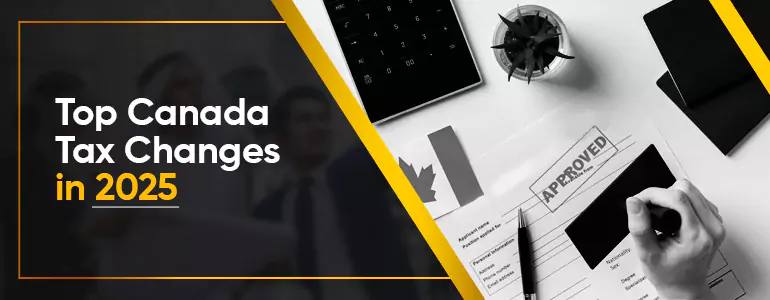Big changes are coming to Canada’s tax system in 2025. If you run a business, invest, or even just file a personal tax return, you will want to know what’s changing.
In a Hurry to Know the Big Canada Tax Changes in 2025?
- Higher CPP Contributions
- New Capital Gains Rates
- Digital Tax Notices
- Stricter Rental Rules
- Updated Tax Brackets
- Higher BPA
- New T4/T4A Reporting
Read on to learn 3 more critical tax changes to stay ahead in 2025!
Say Goodbye to Paper Mail for Business Taxes
Starting in spring 2025, the Canada Revenue Agency (CRA) will stop sending most business tax letters by mail. Instead, they’ll send them online through My Business Account.
This affects:
- New businesses that register for a business number
- Existing businesses already using My Business Account
- Businesses with tax representatives who use “Represent a Client”
What you need to do: Log in to your My Business Account and update your email. That way, CRA will notify you when new tax documents arrive.
Big Changes to Capital Gains Tax in Canada
The capital gains tax changes in Canada have been in the works for a while. The proposed capital gains inclusion rate increase to 66.7% was deferred to January 1, 2026. For 2024, the inclusion rate remains 50% for all capital gains, affecting individuals, trusts, and corporations.
If you sell stocks, rental properties, or other investments that generate capital gains, you may owe more tax than before. The CRA is granting penalty and interest relief for T1 individual filers until June 2, 2025, and T3 trust filers until May 1, 2025, for those reporting 2024 capital gains.
New Rules for Filing Tax Information Returns
Starting January 2025, the way businesses file tax slips like T4s, T3s, T5s, and T4As is changing. Here’s what’s new in Canada tax changes:
- Updated T619 Form: This electronic transmittal form has changed. Make sure you’re using the latest version.
- One Return Type Per Submission: No more combining multiple return types in one submission.
- Better Error Checking: The CRA will now validate submissions in real time and warn you about errors before you file.
Heads up: The CRA’s online filing system will shut down early in December 2024. If you have returns to file, do it before December 2, 2024, to avoid delays. Check the CRA website for the exact shutdown date.
Short Term Rentals Must Follow Local Laws as Part of New Canada Tax Changes
If you rent out a property on Airbnb, Vrbo, or another platform, new tax rules are coming in 2025. To claim deductions on your taxes, your rental must follow local provincial and municipal regulations.
That means if your city requires a permit, registration, or license, you must have it. If you don’t follow the rules, you can’t deduct expenses like mortgage interest, maintenance, and property taxes.
If you’re making money from short-term rentals, double-check your local regulations before tax season.
CPP Contributions Are Going Up Again
Your Canada Pension Plan (CPP) contributions will increase in 2025. The maximum pensionable earnings (YMPE) will be $71,300, and there will also be a new earnings ceiling (YAMPE) of $81,200.
This means that if you earn between $71,300 and $81,200, you’ll have to contribute to CPP2, an additional pension plan layer. If you’re employed, this means a slightly smaller paycheck due to higher deductions. If you’re self-employed, make sure to budget for higher contributions.

2025 Federal Tax Brackets Are Changing
Every year, tax brackets adjust for inflation. Here’s how the new tax brackets will look in 2025 as part new Canada tax changes:
- Income up to $57,374 is taxed at 15%.
- Income from $57,376 to $114,750 is taxed at 20.5%
- Income from $114,751 to $177,882 is taxed at 26%
- Income from $177,883 to $253,414 is taxed at 29%
- Anything above $253,415 is taxed at 33%
If you earn $100,000, for example, you don’t pay 20.5% on everything. You pay 15% on the first $57,375, then 20.5% on the rest. This is why planning your income, deductions, and investments can make a big difference in your final tax bill.
If you want to learn more about corporate tax and tax brackets click here.
Basic Personal Amount (BPA) Is Going Up
The Basic Personal Amount (BPA) is the amount you can earn tax-free. In 2025, this will increase to $16,129. If you make less than this, you won’t owe federal income tax. This is a major update amongst other Canada Tax changes.
However, high-income earners won’t get the full increase. If you’re in the highest tax bracket, your BPA will be $14,538 instead. Every province has its own BPA, so check your provincial tax rules as well.
The CRA is Upgrading Its Online Services
The CRA’s online tax system is getting some updates in 2025 as part of new canada tax changes. If you use My Business Account or Represent a Client, you’ll notice:
- A cleaner layout and easier navigation
- Better email notifications for tax updates
- A new tracking feature for Canada Carbon Rebate payments
- A self-assessment tool for research and development (SR&ED) tax credits
If you file taxes online, expect things to look a little different next year.
New Rules for Reporting Dental Coverage on T4s & T4As
If you’re an employer, you will get an extra year to adjust to new dental coverage reporting rules on T4s and T4As. If you don’t offer dental benefits, you don’t have to report anything for 2024.
However, starting in 2025, all employers must report dental coverage information. If you don’t, you could face penalties. The CRA is even hosting a free webinar on January 29, 2025, to help businesses understand these changes.
Quick FAQs
How to avoid capital gains tax on property in Canada?
Claim the principal residence exemption or reduce tax by holding longer, using capital losses, or gifting to a spouse.
When does the new capital gains tax apply?
Proposed 66.7% inclusion rate deferred to January 1, 2026; 50% rate applies for 2024.
Is Canada Pension Plan (CPP) taxable?
Yes, CPP payments are taxable income, reported on your tax return.
What is a bare trust in Canada?
A trust where the trustee holds assets, but beneficiaries control and owe taxes; exempt from T3 filing for 2023–2024.
When can I start filing taxes for 2025 in Canada?
Tax filing opens in February 2025, with an April 30, 2025, deadline.
What happens if I don’t file a T3 return for a bare trust?
No penalties for 2023–2024 if exempt; future filings may incur $25/day penalties up to $2,500.
Disclaimer: The information provided in this blog is for general informational purposes only. For professional assistance and advice, please contact experts.




